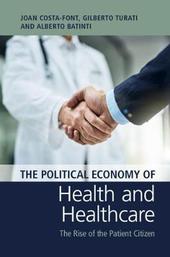
|
The Political Economy of Health and Healthcare: The Rise of the Patient Citizen
Paperback / softback
Main Details
| Title |
The Political Economy of Health and Healthcare: The Rise of the Patient Citizen
|
| Authors and Contributors |
By (author) Joan Costa-Font
|
|
By (author) Gilberto Turati
|
|
By (author) Alberto Batinti
|
| Physical Properties |
| Format:Paperback / softback | | Pages:236 | | Dimensions(mm): Height 227,Width 152 |
|
| Category/Genre | Political economy
Public finance |
|---|
| ISBN/Barcode |
9781108468251
|
| Classifications | Dewey:362.1 |
|---|
| Audience | | Professional & Vocational | | Tertiary Education (US: College) | |
|---|
| Illustrations |
Worked examples or Exercises
|
|
Publishing Details |
| Publisher |
Cambridge University Press
|
| Imprint |
Cambridge University Press
|
| Publication Date |
28 May 2020 |
| Publication Country |
United Kingdom
|
Description
The healthcare sector is one of the fastest growing areas of social and public spending worldwide, and it is expected to increase its government shares of GDP in the near future. Truly global in its scope, this book presents a unified, structured understanding of how the design of a country's health institutions influence its healthcare activities and outcomes. Building on the 'public choice' tradition in political economy, the authors explore how patient-citizens interact with their country's political institutions to determine the organisation of the health system. The book discusses a number of institutional influences of a health system, such as federalism, the nature of collective action, electoral competition, constitutional designs, political ideologies, the welfare effects of corruption and lobbying and, more generally, the dynamics of change. Whilst drawing on the theoretical concepts of political economy, this book describes an institution-grounded analysis of health systems in an accessible way. We hope it will appeal to both undergraduate and graduate students studying health economics, health policy and public policy. More generally, it can help health policy community to structure ideas about policy and institutional reform.
Author Biography
Joan Costa-Font is an associate professor of the Department of Health Policy, at the London School of Economics and Political Science. He is a research fellow of IZA and CESIfo and has been Harkness Fellow at Harvard University, Massachusetts and Visiting Fellow at Paris Dauphine University, the University of California, Los Angeles, Boston College, Massachusetts, and the University of Oxford University, amongst other universities. Gilberto Turati is a professor of Public Finance at the Department of Economics and Finance at the Universita Cattolica del Sacro Cuore. He was Board Member of the European Public Choice Society (2012-2015) and is currently a Board Member of the Italian Society of Public Economics. Alberto Batinti is an associate professor of Economics at the International Business School Suzhou - Xi'an Jiaotong-Liverpool University and External Fellow at the Center for Health Economics at the University of Nottingham Ningbo China. He has published research papers in peer-reviewed academic journals as Public Choice, The European Journal of Political Economy, Kyklos, and Health Economics.
Reviews'An important effort to understanding health policies through a shrewd lens of relevant political and economic institutions. A textbook undoubtedly needed to define new policies at a time our patients are losing patience.' Guillem Lopez Casasnovas, Universitat Pompeu Fabra 'Citizens in democratic countries choose to spend more on health care and to channel more of that spending through the public sector as their incomes rise, but among these countries there is substantial variation in private payments out of pocket and variety of choices among health plans. In contrast to most analyses that see these variations as reducing overall welfare, this book takes the refreshing view that they are determined by voter preferences in a setting that acknowledges both constitutional rules and government as well as market imperfections. It provides valuable insights on whether things can be arranged better in some countries, given unavoidable constraints on government actions and political actors - insights that both help us understand what happens and what is possible.' Mark Pauly, Wharton School, University of Pennsylvania
|